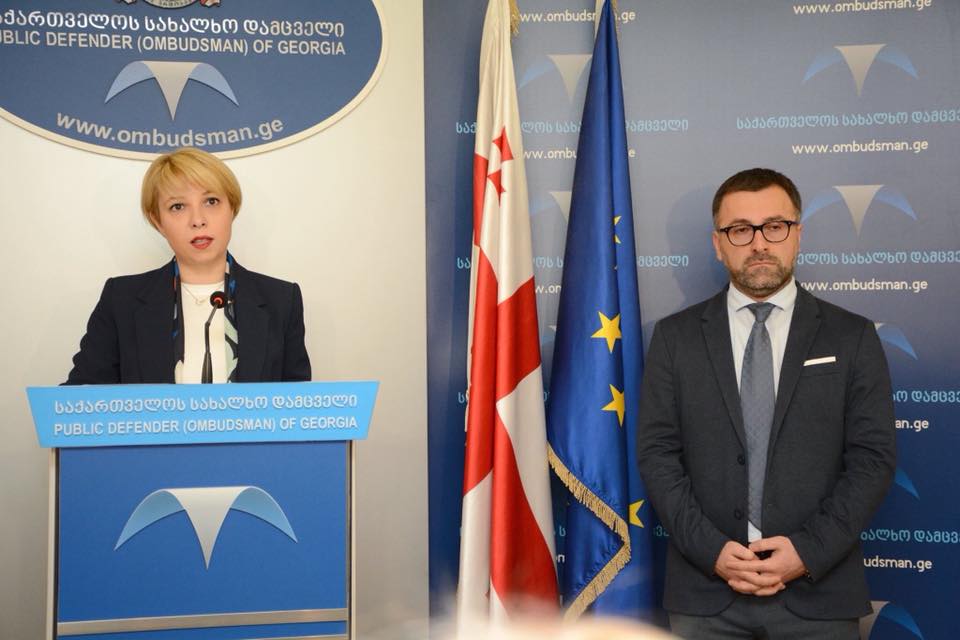
Public Defender to Probe into Harassment Allegations against Prominent Rights Activist

Nino Lomjaria and Zviad Devdariani, March 16, 2018. Photo: facebook.com/cidacso
Georgian Public Defender Nino Lomjaria announced today that she is opening a probe into allegations that a prominent civic activist and the head of the Rustavi-based Civil Development Agency, Zviad Devdariani, sexually harassed multiple women.
“Nino Lomjaria has personally met the women, whose stories contained signs of alleged sexual harassment and sexual abuse,” the Public Defender’s office said following Lomjaria’s meeting with the alleged victims on March 19, three days after she had nominated Devdariani to the Board of Trustees of the Georgian Public Broadcaster (GPB).
The harassment allegations against Devdariani were first voiced by the Georgian Women’s Movement, which said in its statement on March 17, a day after Devdariani’s nomination by the Public Defender, that “up to ten” women who preferred to stay anonymous, were accusing him of “sexual harassment, unwanted physical and verbal behavior of sexual nature.”
“Zviad Devdariani is a well-known women’s rights defender, and it seems that his dual standards and his well-masked personality was the very reason why the women sexually harassed by him failed to find faith and strength to fight for their rights,” the Movement said then.
Zviad Devdariani denied the claims, saying in his March 17 statement that the accusations were “groundless,” and that he had never “abused his position and influence.” He also pointed out that he was being “blackmailed,” since he had received “a message from women’s groups,” that if he refused to withdraw his candidacy, “an open letter” would be published.
Public Defender Nino Lomjaria responded to the Women’s Movement with a statement of her own, saying she “was not aware of the cases of alleged sexual harassment,” and that she had learned about the claims only after his nomination. Lomjaria also noted that Devdariani’s decision to withdraw his candidacy was “reasonable.”
Later on March 17, several Georgian online news outlets, including Netgazeti, Tabula, and On.ge, published anonymous stories of women, including Devdariani’s former employee, job applicants and other professional acquaintances, who had been reportedly harassed by the civic activist. Their accounts describe a wide range of alleged behavior, including lewd remarks, groping, and overt harassment.
Devdariani disputed one of the claims in his March 18 statements to Liberali, saying the story of an alleged twenty-one year old, who accused him of offering to hire her in exchange for sexual favors, was untrue. “I recognize that out of wedlock relationships are my problem, but I categorically deny any facts of violence or pressure,” he said.
A group of twenty-seven current and former staffers of the Civil Development Agency rejected the accusations as well, stressing in their joint statement that the reports were “not true,” and that there had never been “any harassment cases raised by the organization’s staff members.”
Civil Society Reactions
Baia Pataraia, one of the leading members of the Women’s Movement, whose candidacy the Movement had suggested to the Public Defender on March 14, withdrew from the ongoing competition for GPB’s Board of Trustees shortly after the Movement’s initial statement on March 17, citing conflict of interests.
In her Facebook post on March 19, Pataraia said she had communicated with the victims, and added that their accounts “amount to abuse of official position and sexual harassment, while others represent criminal misconduct [by Zviad Devdariani].”
She also dismissed the claims that the campaign was launched intentionally, saying it had to do nothing with the Board competition, and that the victims had merely spoken against “a harasser’s” possible career promotion.
The Coalition for Equality, which unites eight Georgian human rights organizations, released a statement on March 19, expressing its “firm and unequivocal support and solidarity to all female victims of sexual harassment.”
“Analysis of media reports and information obtained by the coalition members showed not the separate cases of harassment, but the alleged sexual and psychological harassment of multiple women at different times and in various intensity,” the CSOs noted.
The organizations then urged the victims to use “legal mechanisms,” and called on the Parliament to “legally recognize sexual harassment as a form of discrimination, enabling [the victims] to apply to the courts.”